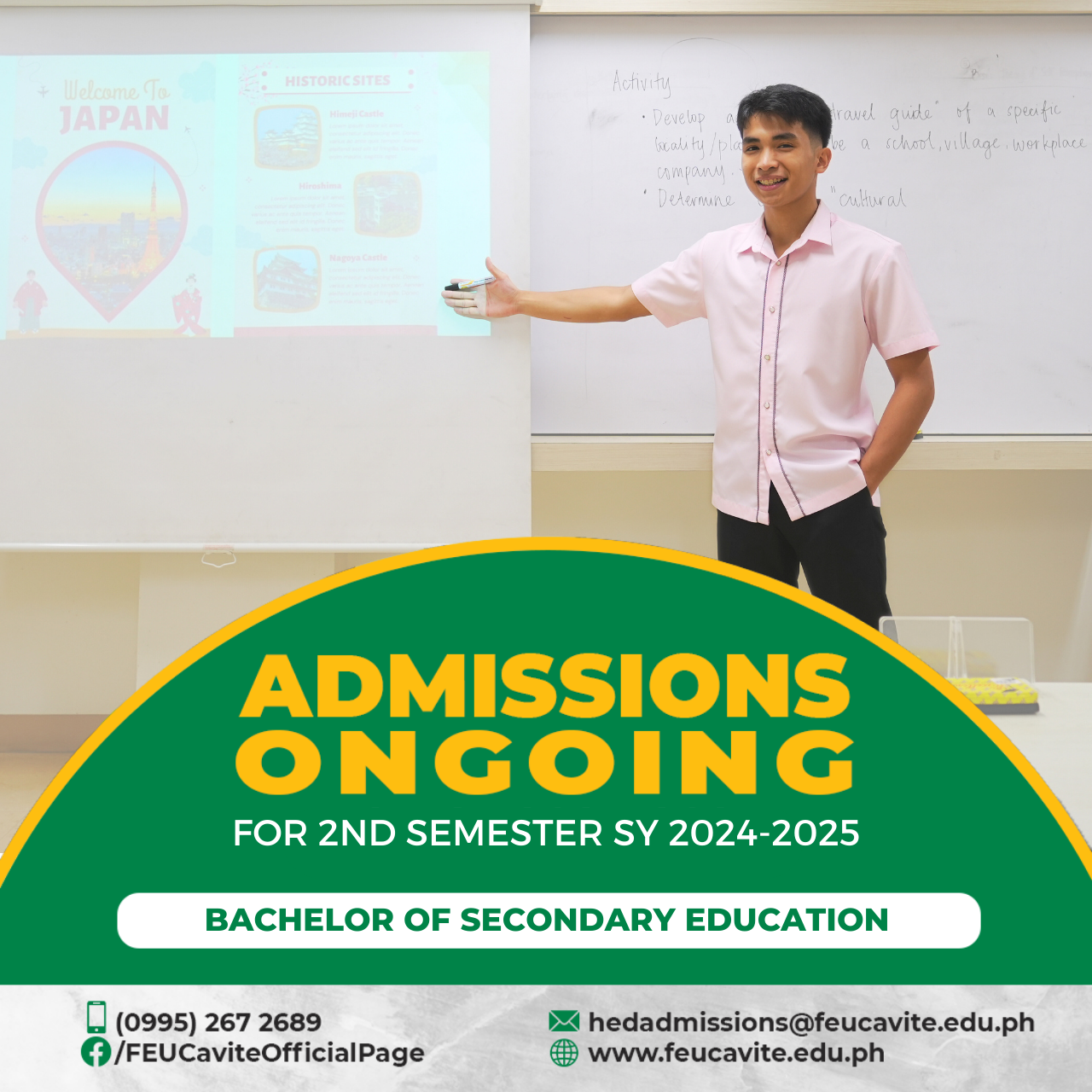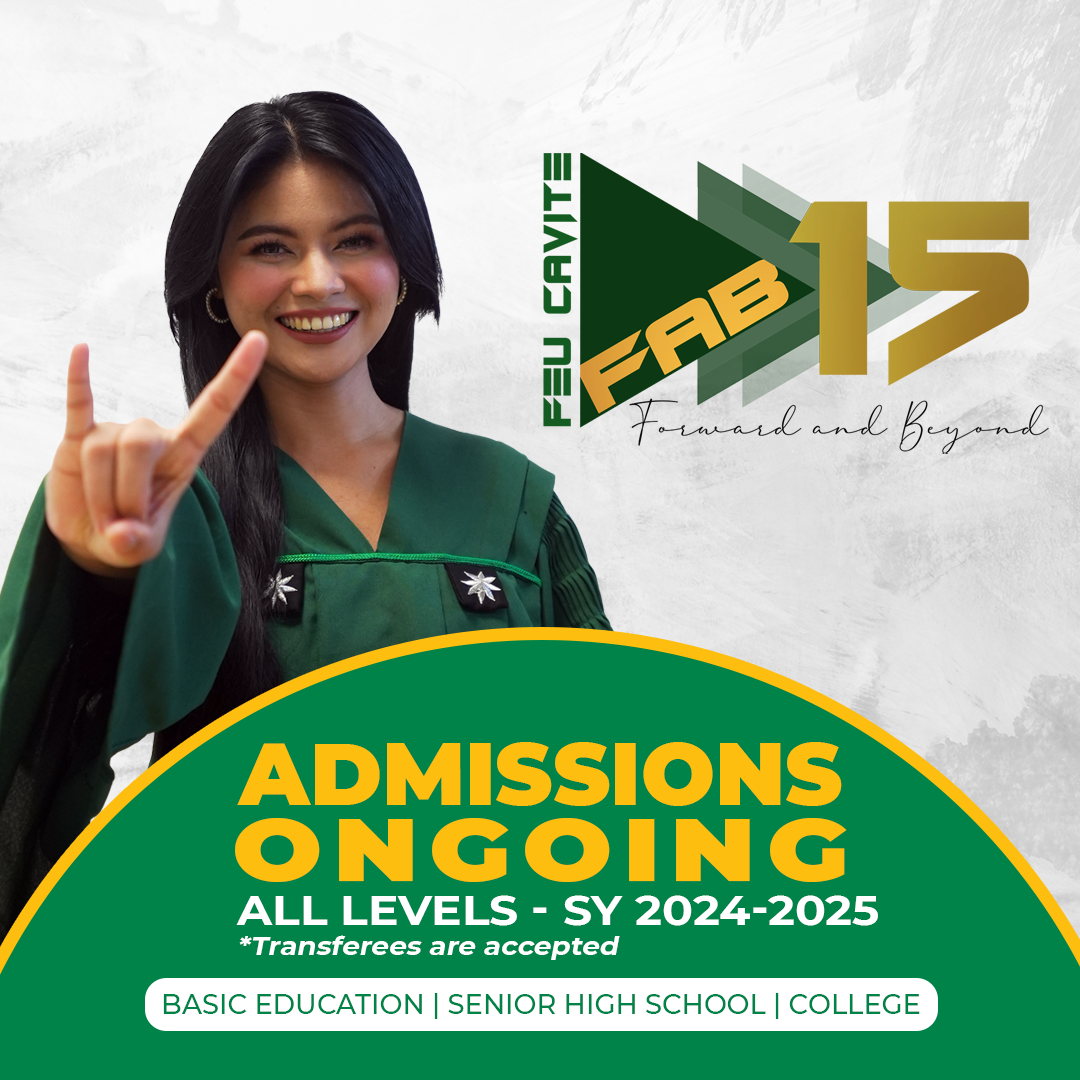Department of Teacher Education & Lifelong Learning

Program Offerings
- Bachelor of Secondary Education Major in English
- Teacher Certificate Program
Dr. Rosendo III B. Comillo
Department Chair
Office Location
Department Chair’s Office, Basement of HED Building
Contact Number
TEL: (046) 419 8500 loc. 216
E-mail
rasy@feucavite.edu.ph
Bachelor of Secondary Education (BSEd) is a four-year undergraduate program, which aims to prepare aspiring educators who intend to teach in the secondary junior and / or senior high school basic education level. Specifically, the program aims to develop highly competent teacher-researchers who specialize in secondary education content, pedagogy, and research.
BSEd is a board program which provides meaningful learning experiences through student-centered learning paradigm and approaches and culminates through a practice-teaching internship. Students of the program are required to choose one area of specialization from the following:
- BSEd Major in English (with 3,042 hours of course work and 408 hours of field study and internship combined)
Each area of specialization of the program focuses on developing pre-service teacher-researchers capable of delivering high quality of research-informed pedagogy in teaching English.
BSEd graduates possess Level VI (Baccalaureate) qualifications under the Philippine Qualifications Framework (code number 60111) and the ASEAN Qualifications Framework. Graduates of this program are qualified to become professional licensed teachers upon passing the prescribed board examination under the Professional Regulation Commission (PRC).
Students who graduated from any Senior High School track can take the BSEd program.
Please click or tap on the sections below for more detailed information about the BSEd program.

Program Objectives
BSEd adheres with the prescribed objectives for teacher education, as indicated in the Commission on Higher Education (CHED) memorandum order (CMO) no. 75, series of 2017. The IE-UGS provides quality teacher education and training. Specifically, it aims to provide:
- Excellent teacher and professional education programs responsive to the needs of the academic community
- Discipline-specific curricula anchored on national and international academic standards
- Updated and relevant assessment methods
- Creative and effective teaching and learning approaches
- Aligned with the current developments in the field of education
- Technologically integrated curricula
- Innovative instructional methodologies
- Outcomes-based curricula
- Nurturing and service – oriented teacher education program
Program Expected Learning Outcomes
BSEd Major in English
On successful completion of this program track, graduates can:
- Use theoretical and practical understanding of language and literature to implement appropriate approaches for effective teaching and learning.
(Linked to FEU Core Competencies: Critical thinking, Problem-solving) - Imbue positive and healthy attitude towards English as a global language in multilingual context as it applies to the teaching of language and literature.
(Linked to FEU Core Competencies: Persuasive communication, Professionalism) - Utilize assessment as valuable tool to effectively measure learning outcomes and evaluate the effectiveness of syllabus as well as the methods and materials used to improve quality of teaching and learning.
(Linked to FEU Core Competencies: Critical thinking, Problem solving) - Create relevant and innovative language and literature learning experience to increase student engagement and motivation.
(Linked to FEU Core Competencies: Critical thinking, Problem solving, Responsible digital citizenship) - Employ innovative language and literature teaching approaches, methodologies and strategies using research-based findings.
(Linked to FEU Core Competencies: Persuasive communication, Critical thinking, Problem solving) - Create technology-aided facilitation techniques in language learning and teaching to ensure coordinated educational experience among students.
(Linked to FEU Core Competencies: Critical thinking, Problem solving, Responsible digital citizenship) - Embolden students and colleagues to lead and synthesize transformative changes in learning and teaching language and literature.
(Linked to FEU Core Competencies: Persuasive communication, Critical thinking, Intellectual curiosity) - Develop and maintain English language teaching expertise through reflective teaching and research-based findings.
(Linked to FEU Core Competencies: Critical thinking, Problem solving, Intellectual curiosity)
Career Pathways
Upon the completion of the BSEd program, graduates are qualified to take the Licensure Examination for Teachers (LET) and are eligible to teach in private and public basic education secondary schools.
Likewise, graduates are eligible to work in other education-related field such as teaching and education research assistants. Graduates of the program may choose to pursue Master of Arts in Education, Master of Arts in Teaching, or other education and area of specialization-related graduate degree programs.
Program Features
This program exhibits a holistic approach in education through the multitude of courses, learning approaches, and assessment it offers.
Program curriculum
In the first two years of the program, General Education (GE) courses focus on developing learner’s foundation skills, like critical thinking and reflection, through facilitation of liberal education content. General Education courses constantly engage learners into critical discussion.
Moreover, the GE also includes university-innovative courses, Scholarly Inquiry, College Academic Skills (CASE), and Speech Communication, which are designed to develop key college study habits, research, and academics skills of students.
On the other hand, Professional Education (Prof Ed) courses cultivate among students the foundational theories and concepts, pedagogical content knowledge, and experiential learning, relevant in learning the art and science of the teaching profession.
Building from the foundation skills of general education courses, Prof Ed courses also engage students into critical discourse on issues and trends in education and thereby pave way to further discussion and research on implications to education theory, practice, and research.
Major/specialization courses of the program focus on mastering disciplinal, inter-disciplinal, and pedagogical content knowledge of the chosen area of specialization.
Utilizing the interdisciplinary content of the specialized courses, and contextualizing pedagogical content knowledge of professional education courses, students of the program are able to conceptualize their teaching and learning paradigms and translate it to relevant and effective education practices in the basic education sector.
Alongside with all of these courses, the Wellness and Recreation Program (WRP), which is a unique innovative-course feature of all programs in the university, is offered every semester to ensure that not only the cognitive faculties of students are developed but as also their physical fitness and socio-emotional soundness.
Teaching-Learning Approaches
Recognizing the essentiality of knowledge generation and information navigation, the following approaches are embedded in the program to empower students on making informed choice as thinking teacher professionals in the future:
- Student-centered learning approach. In line with the university’s teaching and learning philosophy, the program makes use of student-centered learning approaches throughout its courses to enable students to collaborate and co-construct knowledge with their teachers and classmates. This approach, which is rooted on the learning paradigm of the university, makes use of various learning activities designed to initiate cognitive engagement among students through the practice of critical, reflective, creative, and problem-solving thinking skills.
- Interdisciplinary approach. Avoiding the pitfalls of atomistic learning and single-mindedness thinking, the program makes use of interdisciplinary approach where students are able to look into educational and societal trends and issues using different disciplinal lenses. Through learning experiences taking this approach, students are able to make sense of different perspectives and make connections between learnings on different courses.Method of teaching each course of the program is informed by research. Likewise, research on different areas of education as required readings are central to the discussions made inside the classroom. Moreover, course capstone projects come in the form of research-based outputs to instill to students the habit of making research-informed choices in teaching and learning.
- Technology-based learning approach. To promote and develop independent learning, as well as to provide flexibility in terms of learning space, selected courses of the program, in particular, four of the GE courses, utilize blended learning approach where some time allotted for the course is spent for students to attend classes virtually through the use of the university’s learning management system. Likewise, students are exposed in different technological media in attending regular face-to-face meeting for each courses of the program.
Assessment and Research
Completion of courses under the program is dependent to the accomplishment of assessment tasks negotiated by the teacher and students for the semester. As the program values student learning not only as a product but also as a process, formative assessments which are conducted during the learning process are done to monitor and give feedback to students’ works. These formative assessments lead to summative assessments which focus on evaluating student learning at the end of instructional unit and course.
Gearing away from the traditional paper and pencil tests, the program also makes use of authentic or non-traditional assessment to better exhibit learning outcomes intended for the course and the program. This authentic assessment comes in the form of creative capstone projects which serves as a culmination of all relevant learning experiences for the course. Moreover, most of these capstone projects come in the form of research-based outputs to instill to students the habit of making research-informed choices in teaching and learning.
Aside from research-based outputs as capstone projects, two courses of the program are dedicated for students to understand and do research works. The Educational Research and Research on Specialization courses focus on understanding and crafting research broadly in education and specifically in teaching the area of specialization, respectively. Both courses aim for students to produce quality research paper and enable them to understand research as a way of life in the teaching profession.
Internship
Experiential learning courses immerse students in basic education teaching through the supervision of cooperating teachers from partner schools. Field Study 1 and 2 prepare students to full time internship by allowing them to observe, participate, and assist in teaching and learning planning, implementation, and evaluation.
On the last semester of the program, students engage in full time teaching internship as pre-service teachers under the mentorship of a cooperating teacher from the partner basic education school and guidance of the course facilitator.
Moreover, through the pre-service student teacher exchange program, selected and screened pre-service student teachers are given the opportunity to have their practice teaching experience in schools from other Southeast Asian countries.

